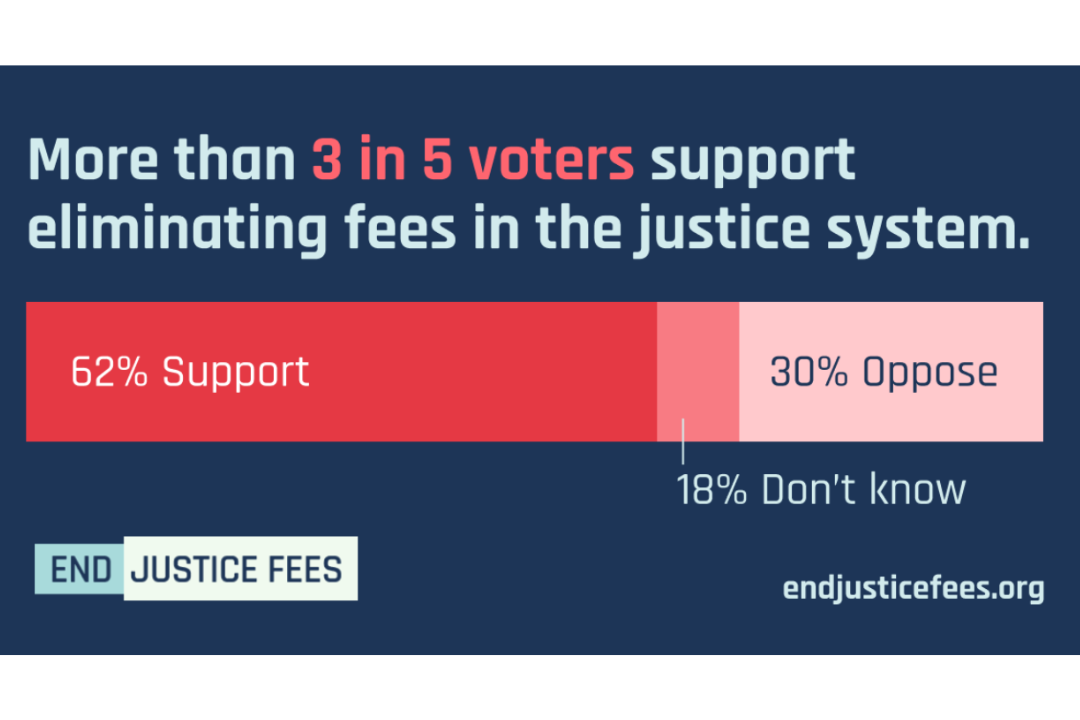National Campaign to Eliminate Justice System Fees Launches Today
New poll reveals 62% of U.S. voters support fee elimination
Today, a bipartisan coalition spearheaded by the Fines and Fees Justice Center, Americans for Prosperity, and the ACLU is launching the End Justice Fees campaign — the first national campaign to eliminate all fees in the justice system and discharge fee debt. Alongside the event, the campaign is debuting a new website that will serve as a primary resource for advocates looking for information, tools, and guidance on how to start and sustain fee elimination advocacy in their respective communities.
“Americans for Prosperity is honored to join this important effort to end fees in the criminal justice system. This debt is only a tax by another name borne by those who can least afford it in our communities, and it focuses police time and resources on tax collection, rather than public safety,” said Greg Glod, Criminal Justice Policy Fellow at Americans for Prosperity. “Many police budgets rely on these fees for their funding, taking line officers away from preventing and solving serious crime. We should fund police at appropriate levels through the ordinary budget process rather than this inconsistent stream of money.”
Advocates for fee elimination are backed by wide support among U.S. voters from all demographic groups. A national poll released today reveals that 62% of voters favor fee elimination, with support cutting across age, gender, geography, race, and political ideologies.
A growing number of states and localities are taking steps to eliminate electronic monitoring fees, probation & parole fees, counsel fees, and the many other fees imposed on people at all levels of the justice system.
In recent years, dozens of states and localities in states both red and blue have enacted reforms to eliminate one or more fees. Oklahoma, Louisiana, Texas and several other states have recently eliminated some or all fees charged to youth in the juvenile system. With successive laws in 2020, 2021, and 2022, California has enacted some of the most far-reaching reforms to date — eliminating 40 fees (including probation, parole, and local booking fees) and discharging over $16.5 billion in court debt.
And on Monday, Delaware Gov. Carney signed legislation eliminating a wide range of fees, including probation and parole fees, public defense fees, and juvenile system fees.
At the local level, several municipalities have recently eliminated fees: Ramsey County, MN, ended probation fees; Baltimore County, MD, ended pre-trial supervision fees; and St. Louis County, MO, ended booking fees, bond fees, and several others.
Fees (also known as costs, assessments or surcharges) are charged at virtually every point in the criminal legal system. Fees are costs the government attaches to every conviction — even traffic tickets and minor infractions. In criminal cases, fees can even be assessed on people who are merely charged with an offense, even if they are ultimately acquitted. While fines are ostensibly imposed as punishment to hold people accountable for violating the law, fees exist solely to raise money for the government — a hidden, regressive tax.
People who can’t afford fees are subjected to punishments that trap them in a cycle of poverty and punishment: incarceration, prolonged or indefinite supervision, driver’s license suspension, and additional fees. Communities of color and low-income communities suffer the most, as state and local governments attempt to extract billions of dollars from individuals and their families.
“In recent decades, state and local governments have drastically increased the use of fees to help fund the relentless expansion of mass criminalization and surveillance,” said Emily Reina Dindial, Senior Policy Counsel at the ACLU’s Justice Division. “When cities and states rely on fees to balance their budgets, it fuels policing-for-profit and the injustice that comes with it. Eliminating fees is a necessary step toward a more legitimate legal system.”
Imposing fees in the justice system is correlated with higher recidivism rates and decreased public safety. Billions of dollars in fees go uncollected around the country — making them an unreliable source for government funding — and the cost of collections can outpace the revenue generated.
“If you’re one of the 60% of Americans living paycheck-to-paycheck, the fees attached to a single traffic ticket could mean missing rent, going without healthcare, or living without basic necessities,” said Priya Sarathy Jones, National Policy & Campaigns Director at the Fines and Fees Justice Center. “The justice system is supposed to serve everyone — and U.S. voters overwhelmingly agree it should be paid for by everyone.”
